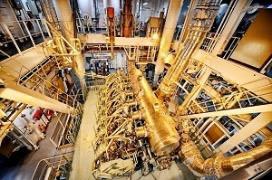
5 minute read
EGCSA
from CSI Autumn 2021
by Maritime-AMC
CAN WE RISK
BUSINESS AS USUAL?
Don Gregory, Director, Exhaust Gas Cleaning Systems Association
We witnessed the return of an iteration of normality with the London International Shipping Week (LISW) earlier this month. Is this the end of COVID-19 stricture and a return to business as usual? Is business as usual actually what the earth needs if we are to avoid mass extinction?
Certainly, everyone I met agreed how good it was to be able to meet again in person – although many of the LISW events were virtual. The highlight of the week was the plenary session. An all-day affair hosted by the International Maritime Organization (IMO) at its HQ in London. Kitak Lim, IMO Secretary General expressed his happiness to see the main auditorium filled after many months and several missed committee meetings.
The day was themed “Driving Growth, Accelerating Reductions in greenhouse gases, the Social Element of Environmental, Social and Governance (ESG) and is it about the Money?”.
In the opening session, Jan Dieleman, President of Cargill Shipping, stated that charterers are increasingly asking for ESG credentials such as energy efficiency operational indicator (EEOI) and seafarer crew change compliance. On the other hand, Professor Tristan Smith claimed that shipping was already two years late on decarbonisation. He indicated that countries have not taken the opportunity created by COVID-19, which has depressed carbon emissions. Instead, the world is accelerating back to business as usual. Soren Toft of Mediterranean Shipping Company (MSC), said it would cost $17tn to decarbonise by 2050 while MSC were today adding 11 new lines to overcome port congestion and container supply imbalances. He expected GPD growth to exceed 6% over the coming two years.
Overall, the picture one could gather from the LISW plenary session and other sessions is that the reality is business as usual predominates shipping business thinking with a real lack of incentive to make significant change.
Taking just one key phrase spoken during plenary: “Shipping is too cheap”. I would like to explore this more deeply. Shipping prides itself in super efficiency and extremely low unit cost for the transport of goods. Often heard is that a pair of $100 sneakers includes less than 3 cents for transport cost across oceans. Do those 3 cents provide the industry with a fit return to reward all its stakeholders, from investors to seafarers? Do those 3 cents pay for the true cost of externalities? In this case, the externalities under consideration are the impacts shipping has on the environment. One such impact is fossil-carbon emissions. The cost of that externality is the marginal cost of an alternative energy source that does not emit fossil-carbon.
I did not hear one mention of what that cost might amount to. It is certainly not the current cost of methanol for example – fuel that Maersk Shipping has advertised as an option to burn on its recently announced set of eight new buildings. The reality is that those ships are likely to be bunkered by fossil-carbon emitting fuels.
With competing demand for methanol, an insignificant supply infrastructure and questions relating to the environmental compatibility of the sourcing of the raw materials, the supply of methanol is unlikely to match demand, resulting in the long-term price of methanol continuing to exceed that of crude-sourced fuels.
What that means is that until the cost of eliminating fossil-carbon is “discovered” the trend will be to promote initiatives and flashy claims, while slipping back into business as usual.
Nothing highlights this more clearly than the untold benefit accruing from ships fitted with wet scrubbers. Although intended to be an option to reduce SOx emissions, administrations and NGOs have ignored the reduced CO2 emissions accrued on a well-to-wake basis from operating on heavy sulphur fuel oil (HSFO). The CE Delft Institute, which provided the IMO with the fuel availability report, has identified between 10% and 20% reduction in fossil-carbon emissions when using a combination of wet scrubbers and HSFO when compared to operating with more highly processed lower sulphur blended fuels.
Even a 10% reduction in overall fossil-carbon emissions today would immediately slow the accumulation of CO2 in the atmosphere.
If the true cost of shipping is eventually “discovered”, probably by a fossil-carbon cap, that value could flow back to the shipping industry making shipping a great value industry and not one that is regarded as “too cheap”.
Business as usual will delay that possibility and make any change in the future a more painful transition.
DESIGN, PRODUCTION, REPAIR OF ALL KINDS OF STAINLESS STEEL, ALUMINIUM AND HIGH PERFORMANCE ALLOYS PRODUCTS FOR CIVIL, DEFENSE, PETROCHEMICAL AND AEROSPACE INDUSTRIES


NORDIC CUSTOM is a manufacturing company that offers extensive expertise in welding, in particular with special materials.
We are a member of PTD Group, with sister companies located in the Netherlands and US. PTD employs more than 300 craftspeople in engineering and manufacturing roles, operating in mission-critical environments under challenging international standards and certifications. NORDIC CUSTOM has a purpose-built workshop located just outside Tallinn, Estonia, with a fabrication area of 4,500m2 and lifting capacity of up to 170 tons. We offer more than 2,000 welding procedures covering most of the materials and welding joints used in the marine, energy and petrochemical industries. In addition, we have an acid pickling facility and offer services such as laser cleaning, soda blasting, product development and engineering. We hold ISO9001, ISO140001, AQAP-2110 and EN3834 certificates.
We provide a wide range of equipment manufacturing, including spools and piping, scrubbers, heat exchangers and pressure vessels, to our customers in the marine, energy and petrochemical industries. With our material and welding know-how, we are an invaluable partner to the marine industry, particularly when it comes to titanium, aluminium and nickel alloys welding. Our on-site service team is on hand to help with special projects and on-site welding. For more information and contacts, please visit our website: NORDIC-CUSTOM.COM










